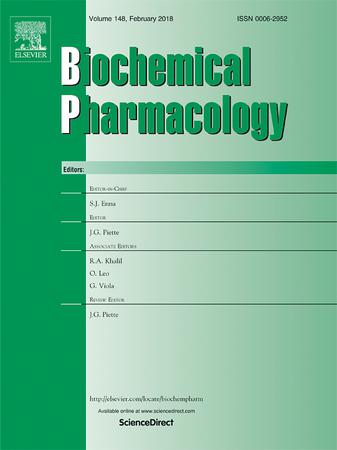p300激活的H3K18乙酰化促进人脂肪源性间充质干细胞成骨。
IF 5.3
2区 医学
Q1 PHARMACOLOGY & PHARMACY
引用次数: 0
摘要
人脂肪源性间充质干细胞(hd - mscs)作为一种可行的干细胞替代来源,因其高易得性而引起了人们的极大兴趣。目前,对hAD-MSCs潜在表观遗传调控机制的研究有限,极大地阻碍了其在骨修复中的临床应用。组蛋白乙酰化已被确定为间充质干细胞(MSCs)成骨分化的关键调节因子,组蛋白乙酰化位点水平的升高通常与成骨分化的增强相关。然而,它们在MSCs成骨中的具体作用尚不清楚。在本研究中,我们观察到在hAD-MSCs成骨诱导过程中H3K18乙酰化(H3K18ac)显著上调。这种修饰在与成骨相关的基因启动子区域显著富集,从而促进成骨分化。此外,在hAD-MSCs中处理组蛋白乙酰转移酶p300抑制剂a -485导致成骨分化过程中H3K18乙酰化水平降低,这与成骨细胞表型和功能降低相对应。这些结果表明,p300介导的H3K18乙酰化增强了hAD-MSCs的成骨分化。为进一步认识hAD-MSCs的成骨分化机制,促进其在骨组织工程中的应用提供了新的思路。本文章由计算机程序翻译,如有差异,请以英文原文为准。

Acetylation of H3K18 activated by p300 promotes osteogenesis in human adipose-derived mesenchymal stem cells
Human adipose-derived mesenchymal stem cells (hAD-MSCs) have garnered significant interest as a viable alternative source of stem cells for applications in bone tissue engineering due to their high and ease availability. At present, the limited studies on potential epigenetic regulatory mechanism in hAD-MSCs greatly hinders its clinical application in bone repair. Histone acetylation has been identified as a critical regulator of the osteogenic differentiation of mesenchymal stem cells (MSCs), with increased levels of histone acetylation sites frequently correlating with enhanced osteogenic differentiation. However, their specific roles in MSCs osteogenesis remain unclear. In this study, we observed a significant up-regulation of H3K18 acetylation (H3K18ac) during the osteogenic induction of hAD-MSCs. This modification was notably enriched in the promoter regions of genes associated with osteogenesis, thereby facilitating osteogenic differentiation. Furthermore, the treatment of histone acetyltransferases p300 inhibitor A-485 in hAD-MSCs resulted in a reduction of H3K18 acetylation levels during the osteogenic differentiation, which corresponded with a diminished osteoblast phenotype and function. These results indicated that p300-mediated acetylation of H3K18 enhances the osteogenic differentiation of hAD-MSCs. It provides a novel insight into understanding the mechanism of osteogenic differentiation of hAD-MSCs and promoting its application in bone tissue engineering.
求助全文
通过发布文献求助,成功后即可免费获取论文全文。
去求助
来源期刊

Biochemical pharmacology
医学-药学
CiteScore
10.30
自引率
1.70%
发文量
420
审稿时长
17 days
期刊介绍:
Biochemical Pharmacology publishes original research findings, Commentaries and review articles related to the elucidation of cellular and tissue function(s) at the biochemical and molecular levels, the modification of cellular phenotype(s) by genetic, transcriptional/translational or drug/compound-induced modifications, as well as the pharmacodynamics and pharmacokinetics of xenobiotics and drugs, the latter including both small molecules and biologics.
The journal''s target audience includes scientists engaged in the identification and study of the mechanisms of action of xenobiotics, biologics and drugs and in the drug discovery and development process.
All areas of cellular biology and cellular, tissue/organ and whole animal pharmacology fall within the scope of the journal. Drug classes covered include anti-infectives, anti-inflammatory agents, chemotherapeutics, cardiovascular, endocrinological, immunological, metabolic, neurological and psychiatric drugs, as well as research on drug metabolism and kinetics. While medicinal chemistry is a topic of complimentary interest, manuscripts in this area must contain sufficient biological data to characterize pharmacologically the compounds reported. Submissions describing work focused predominately on chemical synthesis and molecular modeling will not be considered for review.
While particular emphasis is placed on reporting the results of molecular and biochemical studies, research involving the use of tissue and animal models of human pathophysiology and toxicology is of interest to the extent that it helps define drug mechanisms of action, safety and efficacy.
 求助内容:
求助内容: 应助结果提醒方式:
应助结果提醒方式:


